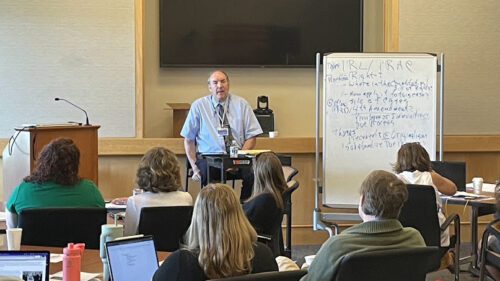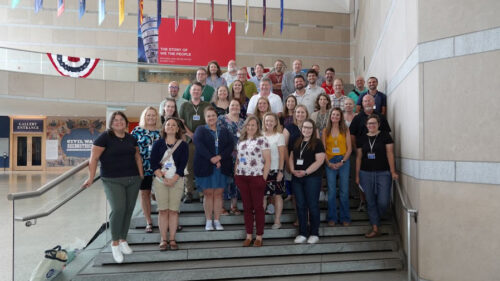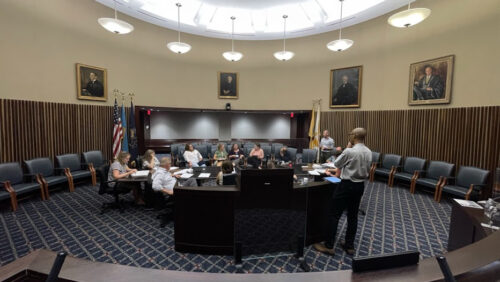Partnering with the Annenberg Public Policy Center (APPC), the Rendell Center for Civics and Civic Engagement hosted two summer teacher programs designed to equip educators with the tools necessary to teach the U.S. Constitution to the next generation of informed Americans.
The first program consisted of a two-part webinar series titled “Teaching Constitutional Law: Understanding the Supreme Court’s Transformation” and “They Did What? A Review and Analysis of the Roberts Court’s Major Decisions in the 2022-2023 Term.” The webinars, held on June 28 and August 8, respectively, were led by renowned judicial biographer and legal scholar Bruce Allen Murphy, Ph.D., of Lafayette College, who provided the participating teachers with the context necessary to teach students the value of judicial independence.
The first online seminar documented the ways in which the Supreme Court has become increasingly politically influenced over the past five decades. Participants learned about the history and politics of judicial appointments, the evolution of partisan influence on the court, and changes in the public’s perception of the court. The second online seminar offered an in-depth review of the 2022-2023 term, including important cases pertaining to affirmative action, President Biden’s student loan forgiveness plan, freedom of speech vs. LGBTQ+ rights, the Voting Rights Act, and religious freedom.
The Summer Teacher Institute
The second of the summer teacher programs, a teacher institute on “The First Amendment in 21st Century America,” provided 34 teachers with the opportunity to learn about the First Amendment in Philadelphia. The program, held from July 23-29, was made possible in part by a major grant from the National Endowment for the Humanities through its summer teacher institute series.
The institute, also directed by Murphy, provided an overview of First Amendment jurisprudence grounded in primary documents. Experts in the field of constitutional law taught daily lectures covering an ambitious array of topics: First Amendment law in the Roberts Court, the debate between originalist and living constitutionalist interpretations of the Constitution, levels of scrutiny and the right to privacy, the relationship between the First Amendment and issues of racial justice, and religious freedom.
Faculty for the program included Berkeley Law Dean Erwin Chemerinsky, Keith Whittington of Princeton University, Nadia E. Brown of Georgetown University, Helena Silverstein of Lafayette College, and Francis Graham Lee, an emeritus professor from St. Joseph’s University.
Lectures were supplemented by readings and immersive learning opportunities. Participating teachers met four federal judges, toured historic Philadelphia and its nationally renowned museums, and took part in a moot court simulation, learning how to implement similar programs in their own curricula.
The Rendell Center and APPC are committed to providing free materials to civics students and teachers throughout the nation. The Rendell Center offers classroom resources for students of all ages, including 49 Read Aloud Lessons, literature-based mock trials, podcasts, and more.
Among other resources, APPC’s initiatives include Annenberg Classroom, offering a broad range of resources on teaching the Constitution from award-winning videos and civics-related video games to an extensive glossary of political terms, and the Civic Renewal Network, which includes 43 partner organizations dedicated to enhancing civics education by providing free, high-quality, nonpartisan educational resources.




